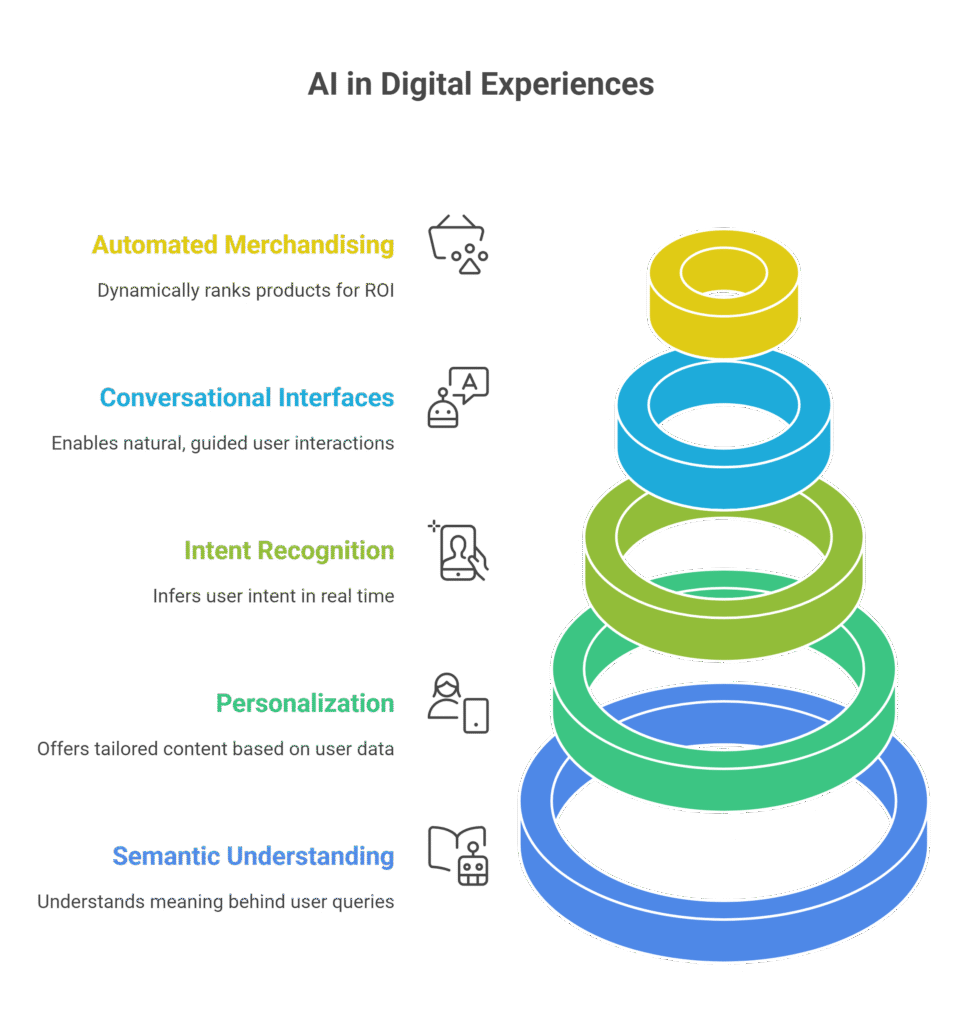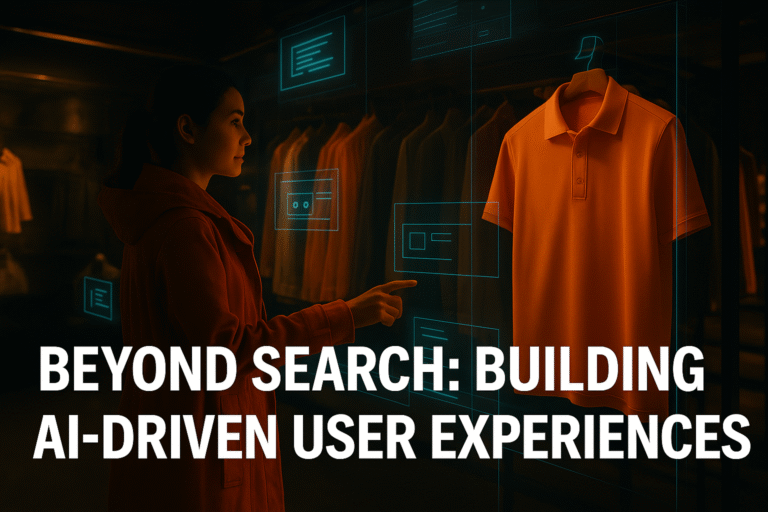In today’s digital-first world, search is just the beginning. While a good search engine helps users find what they’re looking for, businesses must go further to understand what users need, often before they know it themselves. This is where AI-driven user experiences come in.
Modern users expect digital platforms not only to respond but to anticipate, guide, and adapt in real time. From personalized product discovery to intelligent recommendations and contextual interfaces, businesses must now move beyond search to deliver frictionless, tailored experiences.
In this blog, we’ll break down what AI-driven user experiences look like, how they go beyond search, why it matters, and how Expertrec helps brands transform user engagement through intelligent systems.
What Are AI-Driven User Experiences?
AI-driven user experiences refer to dynamic, responsive digital environments that leverage machine learning, natural language processing (NLP), recommendation engines, and behavioral data to interact intelligently with users.
Instead of static content or keyword-matched search results, these systems deliver:
- Personalized product suggestions
- Dynamic search result ranking
- Behavioral intent prediction
- Automated customer support
- Real-time contextual navigation
These AI-powered layers work together to understand the user’s journey, optimize engagement at each touchpoint, and reduce friction in conversion.
Search Alone Is Not Enough
Traditional search engines, even when functional, operate on static keyword matching or rule-based logic. While effective for straightforward queries, they often fall short when users:
- Use vague or ambiguous language
- Don’t know exactly what they need
- Rely on natural language or voice
- Want inspiration or personalized content
As users shift toward natural interactions and higher expectations, businesses must shift from search-as-a-feature to search-as-an-experience, empowered by AI.
Where AI Transforms Digital Experiences

Let’s explore where AI surpasses basic search:
1. Semantic and Vector-Based Understanding
AI can understand the meaning behind user queries using semantic embeddings and vector search. This allows matching based on context rather than exact words.
Example: A user searching for “office shoes for long standing” may be served orthopedic-friendly or cushioned sole shoes, not just any “office shoes.”
2. Personalization Across Sessions
AI models use user history, location, behavior patterns, and preferences to offer personalized landing pages, search results, and content recommendations.
This transforms discovery and increases engagement.
3. Behavioral Intent Recognition
Clickstream analysis and machine learning help infer user intent in real time. Is the user browsing, comparing, or ready to buy? AI adjusts interfaces and offers accordingly.
4. Conversational Interfaces and Smart Assistants
AI integrates with chatbots and voice search to enable natural, guided experiences. The system learns from interactions and provides better support and suggestions over time.
5. Automated Merchandising
AI can also dynamically rank and position products or categories based on:
- Popularity trends
- Margins
- Inventory status
- User segment preferences
This reduces manual merchandising effort while maximizing ROI.
Is It Worth Moving Beyond Search?
The short answer: Yes, if you want to stay competitive.
While basic search functionality is essential, AI-driven digital experiences are becoming the new standard. Failing to invest in them leads to:
- Higher bounce rates
- Low user retention
- Poor product discovery
- Missed upselling/cross-selling opportunities
The value of moving beyond search includes:
- Improved conversion rates (15–30%+)
- Increased average order value (AOV)
- Stronger customer satisfaction and loyalty
- Better inventory turnover and reduced return rates
Are There Better Alternatives?
While open-source solutions like Elasticsearch, Solr, or native platform search can be customized, they often require:
- Dedicated developers and maintenance
- Manual rule-setting and updates
- Lack of true personalization and NLP capabilities
On the other hand, platforms like Algolia or Coveo offer AI-driven features, but they come with high costs and rigid pricing structures, especially at scale.
Why Expertrec Is the Right AI-Powered Choice
Expertrec bridges the gap between traditional search and modern AI-powered experiences, without the overhead or cost of complex enterprise tools.
What Sets Expertrec Apart?
1. AI-Powered Semantic Search
Understand user queries beyond exact keywords using vector embeddings and real-time relevance tuning.
2. Smart Personalization
Expertrec learns from user behavior to deliver contextual product recommendations, search results, and dynamic content layouts.
3. Plug-and-Play Integration
Integrate seamlessly with Shopify, Magento, WooCommerce, BigCommerce, and custom stacks—without requiring an in-house AI team.
4. Voice and Conversational Search
Support for NLP and conversational flows enables future-ready digital commerce that adapts to natural interactions.
5. Real-Time Analytics & Insights
Track user behavior, no-result queries, engagement patterns, and continuously improve the search and discovery engine.
6. Merchandising Control with AI Assistance
Use drag-and-drop merchandising while letting AI optimize placements based on sales goals, inventory, and trends.
Conclusion: AI Experiences That Truly Understand Your Users
In a world where users expect hyper-personalized, frictionless experiences, going beyond search is not optional, it’s essential. Brands that succeed in eCommerce, media, or SaaS are those that embrace AI-driven experiences that learn, adapt, and guide users intelligently.
With Expertrec, you get the best of both worlds: advanced AI capabilities built for conversion, without the complexity or cost of managing your own machine learning infrastructure.
If you’re serious about improving user experience, product discovery, and revenue growth, Expertrec is your AI partner to get there.
FAQs: Beyond Search and AI-Driven Experiences
1. How does AI-driven UX differ from traditional search?
AI-driven experiences use personalization, semantics, behavioral data, and prediction to guide users, while traditional search only matches keywords.
2. Can Expertrec handle personalized recommendations and search together?
Yes, Expertrec provides an integrated platform for AI search and personalized recommendations.
3. Is it possible to add Expertrec to an existing eCommerce platform?
Absolutely. Expertrec supports quick integration with major platforms like Shopify, WooCommerce, and Magento.
4. Does Expertrec use vector embeddings for semantic understanding?
Yes, Expertrec uses advanced AI models and vector search to match results based on context, not just text.
5. How does Expertrec improve user retention?
By offering relevant suggestions, faster navigation, and personalized engagement, users are more likely to return and convert.




